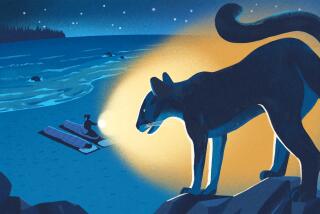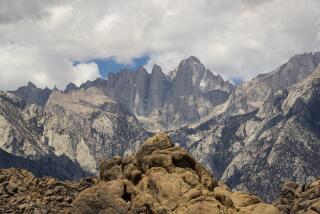Rescued hiker recounts 6 harrowing days in the desert
- Share via
Ed Rosenthal sipped the last of his water the morning after he lost his way in an isolated canyon deep in Joshua Tree National Park. It tasted sweet and delicious. He carried a pack stuffed with survival equipment — a whistle, matches, flares, even a space blanket — but he brought a large water container that was just an eighth full. He left two huge bottles in his hotel room and passed by a spigot in the park.
He meant to hike for four miles at most on a trail from Black Rock Campground that he has walked at least five times before. A 64-year-old real estate broker from Culver City, Rosenthal intended to return that afternoon to the mineral springs resort where he went alone to celebrate his first deal in a year.
In the six days he survived in remote, scorched canyons, Rosenthal drank very little. “What happens is your mouth turns to like sand, and your saliva turns to sand and rocks,” he said.
He thinks he lost about 20 of his 148 pounds. He became so feeble he could not walk or sit up, even against a rock. He ripped apart a yucca plant with a pocket knife and sucked the moisture out, but realized the task exhausted him. He tried to drink his urine, but found it disgusting. “Forget it,” he said.
Rosenthal, who is Jewish but not particularly devout, prayed. He prayed in Hebrew, summoning up as much as he could remember of the Shema Yisrael, the central prayer of Judaism. Finally, he prayed for rain, and 10 seconds later it rained. He lay down in amazement and the drops wet his parched tongue.
“There was definitely a miracle. I’m much more religious now than I was. Seriously. I prayed for rain and it rained,” he marveled. “My conclusion is that God is real. Really. I have to tell you. God is real.”
On Tuesday, Rosenthal told his story for the first time, seated behind a bouquet of microphones at a table upstairs at Clifton’s Brookdale, the 75-year-old landmark cafeteria in downtown Los Angeles that he had helped sell. He brought some of his equipment, including a hiking pole he used to haul himself up in his frail state and his scrawled-on floppy hat, which had become his last will and testament.
With no sign of rescuers on his third day in the Mojave Desert, Rosenthal began to write to his wife and daughter. He wrote that he made a wrong turn, ran out of water and loved them. He told them who to trust for financial advice, who should be pallbearers and who should come to his wake. He wanted a drunken, joyous party with Persian food. He wanted his ashes strewn in Topanga Canyon. He wrote a poem that started: “A brother like you is all good and true.”
Rosenthal said he wanted to explain what happened, but he does not know how he lost the trail, why he plunged into canyon after canyon and why he strayed miles from where he started.
“See, so much of this is, I don’t know why I did it,” he said.
He speaks of it as a mystical experience: “There’s an amazing energy around. It’s not about me, this whole event. I never had that kind of energy to walk 25 miles. I never hike like that.”
Rosenthal, who hikes most weekends, said he “stupidly” brought too little water. “When I set out, I should have not been in a rush. Like, what’s the rush? To drop dead?” he said. He thinks he started with about a pint. “I wasn’t prepared,” he acknowledged.
He had a compass, but no map because he said it was a straightforward hike that he knew. He said a map might have helped. He will still hike alone in the Santa Monica Mountains, he said, but not the desert.
On Friday, Sept. 24, he set out to hike to Warren View. “I love the desert,” he said. “It’s just so spiritual.” On his way back through a wide-open wash, he lost the trail. “It was a huge surprise,” he said.
Rosenthal scrambled through four or five “scary” canyons. “I started jumping into these canyons which I’ve never done,” he said. “I saw that these canyons went on and on, and they were huge.”
To escape, he cut across a “disgusting, horrible,” sun-baked hill. He found a trail, but missed a cutoff. He ended up in a sandy wash that funneled him into rock canyon he said was so gorgeous that he would almost have been willing to die to see it. “It was an incredible experience,” he said.
Rosenthal hiked down for miles with a vigorous stride. The heat became more and more intense, the landscape more and more harsh. “Everything got browner and browner,” he said. He turned around and slept in a “cute, baby canyon.”
When he woke, he could not remember how he got there. He clambered up rocks to get out. But he could not find the wash. He trudged uphill in two different directions, but had no luck. The heat was intense. “I stayed calm and focused. I did not get excited because if you do that then you really just drop dead,” he said.
Rosenthal nestled under a tree that Saturday, breaking off branches to crawl deep inside. Night was frigid. He had set out in a short-sleeved shirt and shorts. He covered himself with the space blanket.
On Sunday, he headed downhill to find a warmer place to camp. “I couldn’t walk. My legs were finished,” he said. He found a canyon with some shade and stayed put. “I made very few steps,” he said. “I got weaker and weaker.” He was pestered by a horsefly, but he came to think of it as a companion. He tried to signal searchers, flashing the space blanket, blowing the whistle and using a flare to set two fires.
He started to write on his hat on Monday. “I really wasn’t sure I would survive,” he said.
Not much was going through his mind. He didn’t think about downtown Los Angeles, where he has played a major role in the sale of historic buildings that have been restored. He didn’t think about poetry, a passion that has earned him some renown as the broker-poet. “All of that mattered, like, zero,” he said.
He did not care whether he lived, he said, but wanted to make it for the sake of his wife of 21 years, Nicole Kaplan, and his 20-year-old daughter, Hilary. “That was my primary motive,” he said.
When he was rescued Thursday, Sept. 30, he believed he had just one more day in him.
A helicopter crew flew into the canyon about 50 feet away and hailed him. “The gentleman asked, ‘Hey, are you that Rosenthal that’s out here?’ I said, ‘Yeah.’ And then that was it,” he said. “I’ve never been so happy to see anybody.” Rosenthal struggled to walk, but could not. The rescuer carried him.
Rosenthal plans to donate to the National Park Service, the California State Parks Foundation and rescuers, including the San Bernardino County Sheriff’s Department, whose searchers found his tracks and flew the helicopter. He asked anyone who wants to contribute to e-mail him at [email protected].
“It’s really a blessing to have those kind of people helping you,” he said.
Back in civilization, after two nights at Hi-Desert Medical Center in Joshua Tree, everything was different. His car seemed incredibly powerful. His house appeared enormous. And water still tastes weird. At the news conference, Rosenthal did not touch the 500-milliliter bottles that sat on the table.
“I don’t think I’m even going hiking for a long time,” he said.
More to Read
Sign up for Essential California
The most important California stories and recommendations in your inbox every morning.
You may occasionally receive promotional content from the Los Angeles Times.









